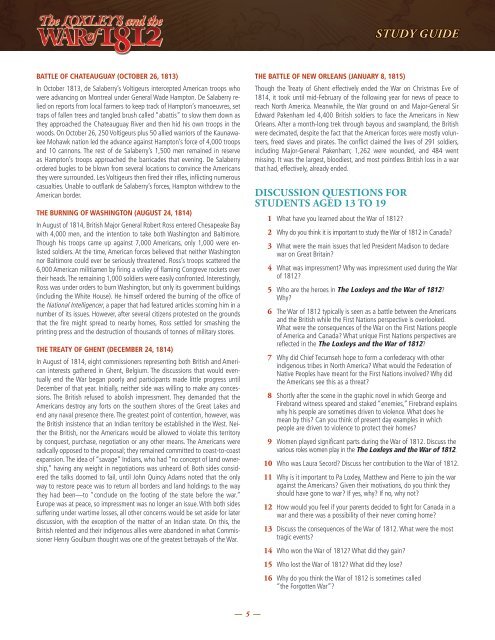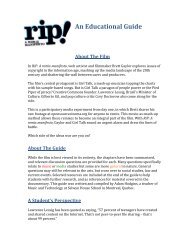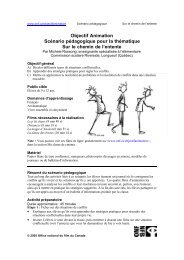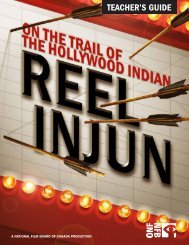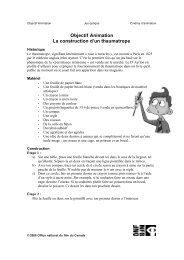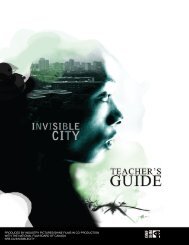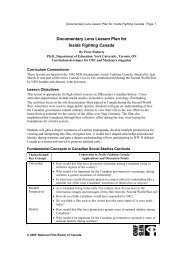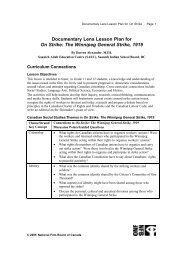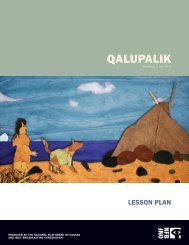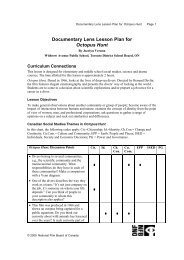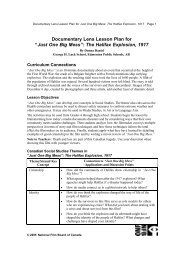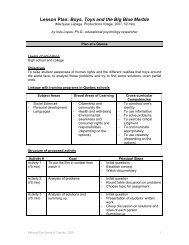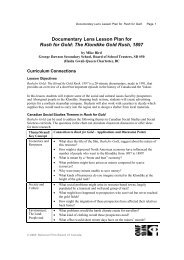STUDY GUIDEFEDERATION OF NATIVE PEOPLESBuilt on the teachings of the Shawnee “Prophet” Lalawethika, Chief Tecumseh’sbrother, the Federation of Native Peoples sought to stop the selling of Indianland to America before and <strong>du</strong>ring the War of 1812. Though its memberswere mostly Shawnee, its leader, Chief Tecumseh, held influence in most nativenations throughout the northwestern United States. As a result, he was ableto recruit members from tribes including the Iroquois, Chickamauga, Ojibway,Mascouten and Potawatomi. However, gaining support was often difficult.Tecumseh’s proposed unification of all Indian nations would undermine theauthority of indivi<strong>du</strong>al chiefs and elders. Many nations and tribes felt themselvesto be on better terms with the Americans and allied with them againstthe Federation. Chief Black Hoof, also Shawnee, was a staunch opponent.Rather than unite with Tecumseh’s cause, Black Hoof urged his people towardcultural adaptation—adoption of the American way of life. At the peak of itsstrength, Tecumseh’s Federation numbered over 5,000 warriors. But with hisdeath in the Battle of the Thames in late 1813, it disintegrated and was neverre-established.ABOUT THE HISTORICAL EVENTSTHE BATTLE OF TIPPECANOE (NOVEMBER 7, 1811)The Battle of Tippecanoe, or “Prophetstown,” took place at a native settlementfounded by Tecumseh and his younger brother, the “Prophet” Lalawethika, onthe banks of the Wabash River in Indiana Territory. Residents of Tippecanoehad set aside tribal differences in order to work towards an Indian confederacy.By 1811, hundreds had flooded into the village to protest Americanland grabs of traditional territory, and Tecumseh had turned to the British forsupplies to feed his rapidly growing community. This enraged Indiana GovernorWilliam Henry Harrison, who resented British involvement and viewed thenatives as a threat to his expansionist policies. Tecumseh was a fierce warrior,but he was not foolhardy and realized the time had not yet come for all-outwar. Instead, he travelled south for a parlay with the Creek Nation, seekingto expand his confederacy. Taking advantage of Tecumseh’s absence, Harrisonplanned a sunrise attack on Tippecanoe for November 7, 1811. News of theplan reached Lalawethika on November 6, however, and he mobilized the500 warriors at Tippecanoe into a pre-dawn ambush. Although the warriorsinflicted heavy casualties, they were ultimately pushed back. Stunned by hislosses however, Harrison went on the defensive, rather than attacking thevillage immediately. By November 8, when an American patrol approachedTippecanoe, it was found abandoned. Harrison ordered the village burned andthe granary plundered. In the spring of 1812, Tecumseh returned and, standing“upon the ashes of [his] home,” he “summoned the spirits of the braveswho had fallen in their vain attempts to protect their homes from the graspinginvader.” This battle left him little choice but to ally himself with Britain in thecoming war. For his part, Harrison called for vengeance through congressmenlike Henry Clay and Felix Grundy, who used Tippecanoe as a rallying cry forwar against Britain.AMERICAN DECLARATION OF WAR (JUNE 18, 1812)One of the most memorable statements—at least among Canadians—onthe subject of America’s declaration of war against the British Empire camefrom Thomas Jefferson: “The conquest of the <strong>Canada</strong>s will be a mere matterof marching.” With most of Britain’s trained soldiers already fighting Napoleonin France, much of the American invading force believed <strong>Canada</strong> to belargely undefended and thus easily overtaken. So, fuelled by the near-religiousconviction of America’s “Manifest Destiny” and Senator Henry Clay’s publicoutrage over the British impressment of American citizens, America went towar in <strong>Canada</strong>. Conquest proved less straightforward than those in powerhad anticipated, however. The sheer size of <strong>Canada</strong> made the question ofwhere to begin marching (and how to distribute forces) difficult to answer. TheAmericans also did not anticipate such a large and willing contingent of Indianfighters and Canadian militiamen.GENERAL WILLIAM HULL INVADES SANDWICH (JULY 12, 1812)By 1812, most of the American public agreed with former President ThomasJefferson that invading the <strong>Canada</strong>s would be “a mere matter of marching.”It had been decided that a primary contingent would advance on Montreal, asecond would push up the Niagara River and a third would sweep out of FortDetroit into the heart of Upper <strong>Canada</strong>. Michigan Territory Governor WilliamHull, who was stationed at Fort Detroit, was in charge of the Upper <strong>Canada</strong>campaign. Hull had little enthusiasm for his command and botched several aspectsof his campaign. The British uncovered his entire invasion plan and capturedmany of his army’s supplies when they took command of the Americanschooner Cayuga, depriving Hull of the element of surprise. He did manageto cross the Detroit River and temporarily occupy the French Canadian villageof Sandwich. Fearing the natives would attack, Hull sent fiery missives to thewhite settlers around Sandwich, threatening to kill any who sided with theIndians. Hull’s worst fears were realized when Tecumseh and a raiding partyambushed a supply column on its way to Fort Detroit on August 5, 1812. Threedays later, Hull ordered Sandwich abandoned and withdrew his army behindthe walls of Fort Detroit.THE ATTACK ON FORT DETROIT (AUGUST 16, 1812)Major-General Isaac Brock’s attack on Fort Detroit is the stuff of legend. Outmannedand outgunned, the first British attempt to take the Fort had beenessentially useless. Then, with the arrival of Shawnee Indian Chief Tecumsehand several hundred of his warriors, the scales began to tip and Brock had anidea: he ordered his trained soldiers to share their uniforms with the regularmilitiamen; marching them back and forth out of firing range, he made itseem that his forces were twice as large. Then, Tecumseh did the same withhis warriors, making sure that American General William Hull got a good lookat the numbers. Finally, Brock gave Hull three hours to surrender the Fort. Hullfell for the trick and surrendered Fort Detroit with no loss of life on either side.QUEENSTON HEIGHTS (OCTOBER 13, 1812)Queenston Heights had sprung up as a waypoint where boats could unloadcargo to be transported throughout Niagara Falls by horse and cart. Becauseof its significance in the movement of supplies, attacking Queenston wouldeffectively cut Lower <strong>Canada</strong> and Upper <strong>Canada</strong> off from one another. TheAmericans attempted to gain ground on the Canadian side of the Niagara butultimately failed <strong>du</strong>e to a highly disorganized campaign and quarreling Americanleadership. The Canadians were led by Major-General Isaac Brock after hisvictorious return from Fort Detroit. Brock was awakened by American artilleryfire and rushed towards Queenston Heights while gathering his troops. Asthey climbed the steep slope of the heights towards the Americans, they weremet with fire, and Brock was hit in the wrist by a musket ball. With his swordheld high, Brock continued to move his troops towards the Americans; but asthey charged forward, Brock was hit again, this time just above the heart, anddied. With Brock’s death, Major General Roger Sheaffe took charge, and histroops continued to lunge at the Americans. The British and Canadians wereoutnumbered, but a strong British artillery and demoralized American soldiers,unwilling to fight on foreign land, led to the surrender of the Americans and adecisive and important victory for the British and Canadians.— 4 —
STUDY GUIDEBATTLE OF CHATEAUGUAY (OCTOBER 26, 1813)In October 1813, de Salaberry’s Voltigeurs intercepted American troops whowere advancing on Montreal under General Wade Hampton. De Salaberry reliedon reports from local farmers to keep track of Hampton’s manoeuvres, settraps of fallen trees and tangled brush called “abattis” to slow them down asthey approached the Chateauguay River and then hid his own troops in thewoods. On October 26, 250 Voltigeurs plus 50 allied warriors of the KaunawakeeMohawk nation led the advance against Hampton’s force of 4,000 troopsand 10 cannons. The rest of de Salaberry’s 1,500 men remained in reserveas Hampton’s troops approached the barricades that evening. De Salaberryordered bugles to be blown from several locations to convince the Americansthey were surrounded. Les Voltigeurs then fired their rifles, inflicting numerouscasualties. Unable to outflank de Salaberry’s forces, Hampton withdrew to theAmerican border.THE BURNING OF WASHINGTON (AUGUST 24, 1814)In August of 1814, British Major General Robert Ross entered Chesapeake Baywith 4,000 men, and the intention to take both Washington and Baltimore.Though his troops came up against 7,000 Americans, only 1,000 were enlistedsoldiers. At the time, American forces believed that neither Washingtonnor Baltimore could ever be seriously threatened. Ross’s troops scattered the6,000 American militiamen by firing a volley of flaming Congreve rockets overtheir heads. The remaining 1,000 soldiers were easily confronted. Interestingly,Ross was under orders to burn Washington, but only its government buildings(including the White House). He himself ordered the burning of the office ofthe National Intelligencer, a paper that had featured articles scorning him in anumber of its issues. However, after several citizens protested on the groundsthat the fire might spread to nearby homes, Ross settled for smashing theprinting press and the destruction of thousands of tonnes of military stores.THE TREATY OF GHENT (DECEMBER 24, 1814)In August of 1814, eight commissioners representing both British and Americaninterests gathered in Ghent, Belgium. The discussions that would eventuallyend the War began poorly and participants made little progress untilDecember of that year. Initially, neither side was willing to make any concessions.The British refused to abolish impressment. They demanded that theAmericans destroy any forts on the southern shores of the Great Lakes andend any naval presence there. The greatest point of contention, however, wasthe British insistence that an Indian territory be established in the West. Neitherthe British, nor the Americans would be allowed to violate this territoryby conquest, purchase, negotiation or any other means. The Americans wereradically opposed to the proposal; they remained committed to coast-to-coastexpansion. The idea of “savage” Indians, who had “no concept of land ownership,”having any weight in negotiations was unheard of. Both sides consideredthe talks doomed to fail, until John Quincy Adams noted that the onlyway to restore peace was to return all borders and land holdings to the waythey had been—to “conclude on the footing of the state before the war.”Europe was at peace, so impressment was no longer an issue. With both sidessuffering under wartime losses, all other concerns would be set aside for laterdiscussion, with the exception of the matter of an Indian state. On this, theBritish relented and their indigenous allies were abandoned in what CommissionerHenry Goulburn thought was one of the greatest betrayals of the War.THE BATTLE OF NEW ORLEANS (JANUARY 8, 1815)Though the Treaty of Ghent effectively ended the War on Christmas Eve of1814, it took until mid-February of the following year for news of peace toreach North America. Meanwhile, the War ground on and Major-General SirEdward Pakenham led 4,400 British soldiers to face the Americans in NewOrleans. After a month-long trek through bayous and swampland, the Britishwere decimated, despite the fact that the American forces were mostly volunteers,freed slaves and pirates. The conflict claimed the lives of 291 soldiers,including Major-General Pakenham; 1,262 were wounded, and 484 wentmissing. It was the largest, bloodiest, and most pointless British loss in a warthat had, effectively, already ended.DISCUSSION QUESTIONS FORSTUDENTS AGED 13 TO 191 What have you learned about the War of 1812?2 Why do you think it is important to study the War of 1812 in <strong>Canada</strong>?3 What were the main issues that led President Madison to declarewar on Great Britain?4 What was impressment? Why was impressment used <strong>du</strong>ring the Warof 1812?5 Who are the heroes in The Loxleys and the War of 1812?Why?6 The War of 1812 typically is seen as a battle between the Americansand the British while the First Nations perspective is overlooked.What were the consequences of the War on the First Nations peopleof America and <strong>Canada</strong>? What unique First Nations perspectives arereflected in the The Loxleys and the War of 1812?7 Why did Chief Tecumseh hope to form a confederacy with otherindigenous tribes in North America? What would the Federation ofNative Peoples have meant for the First Nations involved? Why didthe Americans see this as a threat?8 Shortly after the scene in the graphic novel in which George andFirebrand witness speared and staked “enemies,” Firebrand explainswhy his people are sometimes driven to violence. What does hemean by this? Can you think of present day examples in whichpeople are driven to violence to protect their homes?9 Women played significant parts <strong>du</strong>ring the War of 1812. Discuss thevarious roles women play in the The Loxleys and the War of 1812.10 Who was Laura Secord? Discuss her contribution to the War of 1812.11 Why is it important to Pa Loxley, Matthew and Pierre to join the waragainst the Americans? Given their motivations, do you think theyshould have gone to war? If yes, why? If no, why not?12 How would you feel if your parents decided to fight for <strong>Canada</strong> in awar and there was a possibility of their never coming home?13 Discuss the consequences of the War of 1812. What were the mosttragic events?14 Who won the War of 1812? What did they gain?15 Who lost the War of 1812? What did they lose?16 Why do you think the War of 1812 is sometimes called“the Forgotten War”?— 5 —


